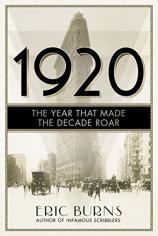1920: The Year that Made the Decade Roar
Review
1920: The Year that Made the Decade Roar
In 1920, “Americans were hopeful that the worst was behind them.” As news correspondent and author Eric Burns (THE SPIRITS OF AMERICA, THE SMOKE OF THE GODS) proves, this hope would be tempered by seismic cultural changes, many of which were launched in the first year of the only decade in our history to have its own nickname.
Three major factors that rocked the nation were the final end to the “war to end all wars” (though it didn’t) and two Constitutional amendments --- one allowing women to vote and the other preventing all Americans from consuming alcohol. The former endured and arguably changed the course of US politics; the latter was possibly the most ignored law in our history. But Burns points out that, in general, though Prohibition is often portrayed in a sardonic light, it very likely saved many lives (“fewer cases of cirrhosis of the liver”) and helped large numbers of American to lead more productive lives (“college administrators found their students to be more sober”).
"1920 is a roaring read, a thorough and thoughtful appraisal of a single year in our past and all its implications for our future."
The country was in the grip of smaller, but no less portentous, issues, notably the first major act of foreign terrorism on American soil: the bombing on Wall Street. Burns follows the investigation of this outrageous action through the year, and though the specific perpetrators were never identified, signs pointed to Italian anarchists, certainly of an anti-capitalist and possibly communist strain. There were even suspicions that the Ku Klux Klan might have been involved, because it did have an active policy of creating terror, and was known as anti-immigrant and anti-government.
An obscure conman who went by the name of Ponzi was inventing a new kind of crime that would bear his name. African American men were finding that fighting for the country on foreign soil gained them nothing back home, and farm boys were learning that factory work was at least as hard as ploughing and money didn't grow on the few trees in America's increasingly crowded cities. By 1920, President Woodrow Wilson was in seclusion, and in a very real sense, the country was being run by his wife, Ellen; this at a time when the issue of women’s rights was generating its own sparks.
The very controversial Margaret Sanger (she advocated, among other causes, the policy of eugenics) was exhorting women to take control of their destinies; she spoke openly about contraception --- and the flappers got the message. Flappers were also smoking cigarettes (lots of them), a flagrantly antisocial and sexually charged behavior that, along with flesh-colored stockings, short skirts and a provocative way of moving on the dance floor, made these young restless women a symbol of the decade.
1920 also saw the ascension of some of the century’s greatest artists, the names evoking the passions and growing pains of the decade: Louis Armstrong, Eugene O’Neill, F. Scott and Zelda Fitzgerald (“embodiments of the wild side of the era”), Bessie Smith, D H Lawrence and Paul Robeson. Sinclair Lewis dared to poke holes in the myth of the American small town with his hyperbolic MAIN STREET, and the Harlem Renaissance brought out the best of African American music and word craft. Jazz, free verse and the "lost generation" were born. The “talking box” brought it all home to Americans, along with the news, making trends impossible to ignore and easy to follow.
1920 is a roaring read, a thorough and thoughtful appraisal of a single year in our past and all its implications for our future.
Reviewed by Barbara Bamberger Scott on May 22, 2015
1920: The Year that Made the Decade Roar
- Publication Date: August 9, 2016
- Genres: History, Nonfiction
- Paperback: 400 pages
- Publisher: Pegasus Books
- ISBN-10: 1681771608
- ISBN-13: 9781681771601




